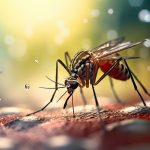Cold sores
What are cold sores?
Cold sores are small blister-like spots that appear in or around the outside of the mouth and are caused by infection with the herpes simplex virus. There is no cure for cold sores, but there are ways to treat the symptoms and prevent new outbreaks.
What are the symptoms of cold sores?
Cold sores start with an itchy and tingling sensation usually on the mouth, lips or nose and may form small blisters that crust after 3 days.

Cold sores usually clear up after 2 weeks without leaving any scars. They can be highly contagious, even when the blisters aren’t present. The virus can spread between people by direct physical contact, such as kissing, skin-to-skin contact and sharing drink containers, eating utensils, towels or toothbrushes with someone who already has a cold sore.
As well as a blister-like spot, the following symptoms are also common:
- fever
- nausea
- headaches
- pain and swelling in the mouth
- sore throat
- swollen glands
- dehydration
What causes cold sores?
There are 2 types of herpes simplex virus. Cold sores are usually caused by the herpes simplex virus type 1 (HSV-1). Herpes simplex virus type 2 causes most cases of genital herpes. However, both viruses can cause either cold sores or genital herpes.
About 80 per cent of adults are infected with HSV-1. Most people are infected when they are young and the infection lasts for life. However, the virus can remain dormant (inactive) in many people, meaning that cold sores may never appear.
Various factors can cause the virus to become active resulting in one or more cold sores. They can include:
- tiredness and fatigue
- a break in the skin near the affected area
- periods (menstruation)
- emotional upset or stress
- strong sunlight, cold or wind
- alcohol
- colds, flu or fevers that make the body less able to fight off infection
When should I see my doctor?
You may need to see a doctor if you have more severe symptoms or a weakened immune system — if, for example, you have HIV or you are having cancer treatment.
It’s also a good idea to see your doctor if:
- there are signs the cold sore is infected, such as redness around the sore, pus and a fever
- you aren’t sure you have a cold sore
- the cold sore isn’t healing, it’s spreading or you have more than one cold sore
- your cold sore has spread to near your eyes
- you get cold sores often
How are cold sores treated?
Medications
Antiviral creams or ointments such as aciclovir, famciclovir and valaciclovir should be used in the first few days of a cold sore outbreak when a tingling sensation or a raised sore or blister is first noticed. These are available without prescription from pharmacies and other shops and supermarkets.
A single dose of antiviral tablets is also available from your pharmacist without a prescription. Talk to your pharmacist to see if they are right for you.
Your pharmacist may also recommend products to treat the short-term symptoms of a cold sore. Povidone-iodine ointments (commonly known as Betadine) may reduce symptoms in some people.
If you are in pain, paracetamol may be helpful. Alternatively, get advice from your doctor on medicines you can take.
If you have frequent severe cold sores, your doctor may prescribe an oral antiviral medicine to stop the virus from reactivating.
Complementary medicines
Some complementary medicines have been promoted as preventing cold sores. One of these products is an amino acid called lysine — but there is no evidence that it is effective.
Self-help
If you have a cold sore there are several things you can do to help manage the condition.
- Creams and ointments should be gently dabbed on to the cold sore rather than rubbed on.
- Ice can be soothing.
- Lip balms, including petroleum jelly, may help if your cold sore is painful or dry. They may also help to prevent the cold sore from cracking once it has crusted over.
- If brushing your teeth is too painful, try using an antiseptic mouthwash instead.
- If the cold sores are around your mouth, try to eat soft foods, but avoid anything salty or acidic (such as lemons) that may irritate your cold sore.
- Avoid close contact with babies and infants.
- Try not to lick, poke or pick at the area.
- Keep the cold sore dry and clean.
Can cold sores be prevented?
There are steps you can take to prevent spreading cold sores to others if you have them:
- Avoid any direct physical contact with other people, particularly kissing or intimate sexual activities such as oral sex.
- Always wash your hands if you touch the affected area.
- Try not to share things like cups, cutlery, towels, toothbrushes, razors, flannels and cold sore creams with anyone else.
- Try not to pick at a cold sore as this can lead to further infection and/or scarring.
There are also ways to prevent spreading cold sores from erupting again:
- Try to avoid your triggers. Triggers are different for different people but can include things like a cold (flu), sunlight, very windy conditions, emotional or physical stress and hormonal changes.
- Take care of your general health — avoid getting run down and overly stressed.
Complications of cold sores
For most people, cold sores get better in time with over-the-counter treatments and self-care. However, for people with weakened immune systems, cold sores can be more severe and spread more widely.
Uncommon complications of cold sores include:
- bacterial infections — where the cold sore is crusty and has pus
- cold sores that spread to the eyes — see your doctor immediately since this can lead to eye damage


